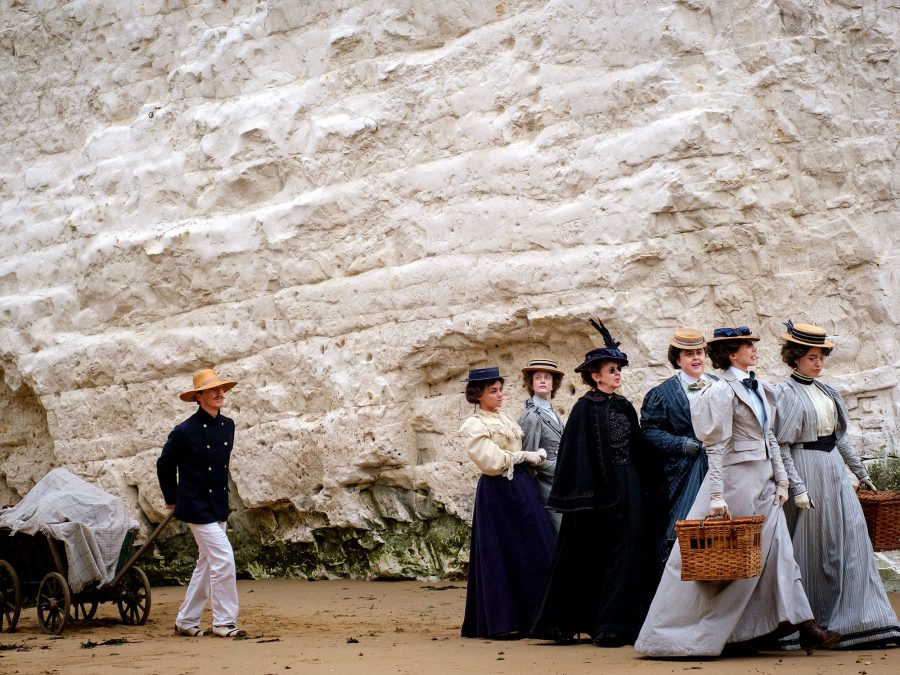The director of acclaimed TV series Flowers and Giri/Haji, Will Sharpe has a penchant for dark subject matters with a comedic edge. His latest feature, The Electrical life of Louis Wain, follows in the same vein as it traces the life of the eponymous figure (Benedict Cumberbatch), an ‘outsider’ artist whose main focus of study is cats. The biopic form takes on a playful and colourful eccentricity, mirroring the personality and kaleidoscopic worldview of its protagonist.
Born in 1860, with a cleft-lip and latent schizophrenia, Wain becomes the breadwinner of his family after the death of his father. He is suddenly responsible for five unmarried sisters and an invalid mother. But his overzealous imagination and frenetic impulses to create art – rather than find employment – means he cannot live up to the expectations of his family, most of all his frustrated oldest sister Caroline (Andrea Riseborough).
Wain’s surreal and technicoloured vision of the world contrasts with the black-and-white strictures of a rigid Victorian society, a vision that shows a lack of compassion towards those who transgress social norms. Wain and his family are ostracised in a world of gossip-loving curtain-twitchers, and it is against this hostile backdrop that Wain’s love for cats develops. He identifies with the strays, who at that time, were not domesticated pets, but regarded as vermin.

Fortunately, Wain’s talent for drawing at lightening speed attracts the attention of Sir William Ingram (Toby Jones), the editor of Illustrated London News, who gives him a position as staff illustrator. Yet every time Wain takes a step forward in life, his psychological distress (his mind a tempestuous, “screaming hurricane”) thwarts his familial and professional relationships. When he marries the penniless and cat-loving governess, Emily Richardson (Claire Foy), who in real life was ten years his senior, it causes a scandal amongst the locals.
At the heart of the film is a love story between Wain and Emily, one that morphs into a tale of grief when Emily is diagnosed with terminal cancer. Cats serve as a metaphor, accentuating his estrangement from the world and recalling memories of his wife and their beloved cat Peter.
But it is the film’s adoption of too many themes – from cats to the potential of electricity – that hinders the story. Despite the strong performances by Cumberbatch and Foy, the complex weaving together of symbolic strands feels contrived; they hang loosely together by a precarious thread.
The film is enjoyable largely because of the strong casting and unexpected star cameos, including a famous rock god (hint: with an Australian accent) playing HG Wells. But the power of the human story is let down by oversentimentality, which the score by Arthur Sharpe doesn’t help.
Cat-lovers will likely find something here to latch on to, but the film may not convince everyone that Wain was an exceptionally significant artist, let alone that it’s an ideal use for Sharpe’s talents. It is nevertheless a touching human story, celebrating an overlooked outlier.
ANTICIPATION.
A star-studded cast sets the bar high. 4
ENJOYMENT.
There is rarely a dull moment in this colourful film. 3
IN RETROSPECT.
Constant recourse to oversentimentality lets the story down. 3
Directed by
Will Sharpe
Starring
Benedict Cumberbatch, Claire Foy, Andrea Riseborough
The post The Electrical Life of Louis Wain appeared first on Little White Lies.
from Little White Lies https://ift.tt/3G1cRe5
via IFTTT

0 Comments